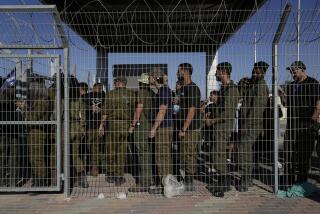U.S. military tortured Guantanamo detainee, tribunal overseer says
WASHINGTON — The top Bush administration official in charge of deciding whether to bring Guantanamo Bay detainees to trial has concluded that the U.S. military tortured a Saudi national who allegedly planned to participate in the Sept. 11, 2001, attacks, interrogating him with techniques that included sustained isolation, sleep deprivation, nudity and prolonged exposure to cold, leaving him in a “life-threatening condition.”
“We tortured [Mohammed] Qahtani,” said Susan J. Crawford in her first interview since being named convening authority of military commissions by Defense Secretary Robert M. Gates in February 2007. “His treatment met the legal definition of torture. And that’s why I did not refer the case” for prosecution.
Crawford, a retired judge who served as general counsel for the Army during the Reagan administration and as Pentagon inspector general when Dick Cheney was secretary of Defense, is the first senior Bush administration official responsible for reviewing practices at Guantanamo to publicly state that a detainee was tortured.
Crawford, 61, said the combination of the interrogation techniques, their duration and the impact on Qahtani’s health led to her conclusion. “The techniques they used were all authorized, but the manner in which they applied them was overly aggressive and too persistent. . . . You think of torture, you think of some horrendous physical act done to an individual. This was not any one particular act; this was just a combination of things that . . . hurt his health. It was abusive and uncalled for. And coercive. Clearly coercive. It was that medical impact that pushed me over the edge” to call it torture, she said.
Military prosecutors said in November that they would seek to refile charges against Qahtani, 30, based on subsequent interrogations that did not employ harsh techniques. But Crawford, who dismissed war-crimes charges against him in May, said in the interview that she would not allow the prosecution to go forward.
Qahtani was denied entry into the United States a month before the Sept. 11 attacks and was allegedly planning to be the plot’s 20th hijacker. He was later captured in Afghanistan and transported to Guantanamo in January 2002. His interrogation took place over 50 days from November 2002 to January 2003, though he was held in isolation until April 2003.
“For 160 days his only contact was with the interrogators,” said Crawford, who personally reviewed Qahtani’s interrogation records and other military documents. “Forty-eight of 54 consecutive days of 18- to 20-hour interrogations. Standing naked in front of a female agent. Subject to strip searches. And insults to his mother and sister.”
The interrogation, portions of which have been previously described in news reports, was so intense that Qahtani had to be hospitalized twice at Guantanamo with bradycardia, a condition in which the heart rate falls below 60 beats a minute and which in extreme cases can lead to heart failure and death. At one point Qahtani’s heart rate dropped to 35 beats per minute, the record shows.
The Qahtani case underscores the challenges facing the incoming Obama administration as it seeks to close the controversial detention facility at Guantanamo Bay, Cuba, including the dilemmas posed by individuals considered too dangerous to release but whose legal status is uncertain.
FBI “clean teams,” which gather evidence without using information gained during controversial interrogations, have established that Qahtani intended to join the 2001 hijackers. Mohamed Atta, the plot’s leader, who died steering American Airlines Flight 11 into the World Trade Center, went to the airport in Orlando, Fla., to meet Qahtani on Aug. 4, 2001, but the young Saudi was denied entry by a suspicious immigration inspector.
“There’s no doubt in my mind he would’ve been on one of those planes had he gained access to the country in August 2001,” Crawford said of Qahtani, who remains detained at Guantanamo. “He’s a muscle hijacker. . . . He’s a very dangerous man. What do you do with him now if you don’t charge him and try him? I would be hesitant to say, ‘Let him go.’ ”
That, she said, is a decision that President-elect Barack Obama will have to make. Obama repeated Sunday that he intends to close the Guantanamo facility but acknowledged the challenges involved.
“It is more difficult than I think a lot of people realize,” Obama said on ABC’s “This Week,” “and we are going to get it done, but part of the challenge that you have is that you have a bunch of folks that have been detained, many of whom may be very dangerous, who have not been put on trial or have not gone through some adjudication. And some of the evidence against them may be tainted, even though it’s true.”
President Bush and Vice President Cheney have said that interrogations never involved torture.
Crawford, a lifelong Republican, ordered the war-crimes charges against Qahtani dropped in May. But she did not state publicly that the harsh interrogations were the reason.
“It did shock me,” she said. “I was upset by it. I was embarrassed by it. If we tolerate this and allow it, then how can we object when our servicemen and women, or others in foreign service, are captured and subjected to the same techniques? How can we complain? Where is our moral authority to complain? Well, we may have lost it.”
Crawford said Bush was right to create a system to try unlawful enemy combatants captured in the war on terrorism, but the implementation was fatally flawed. “I think someone should acknowledge that mistakes were made, and that they hurt the effort, and take responsibility for it,” she said. “We learn as children it’s easier to ask for forgiveness than it is for permission. I think the buck stops in the Oval Office.”
More to Read
Sign up for Essential California
The most important California stories and recommendations in your inbox every morning.
You may occasionally receive promotional content from the Los Angeles Times.










